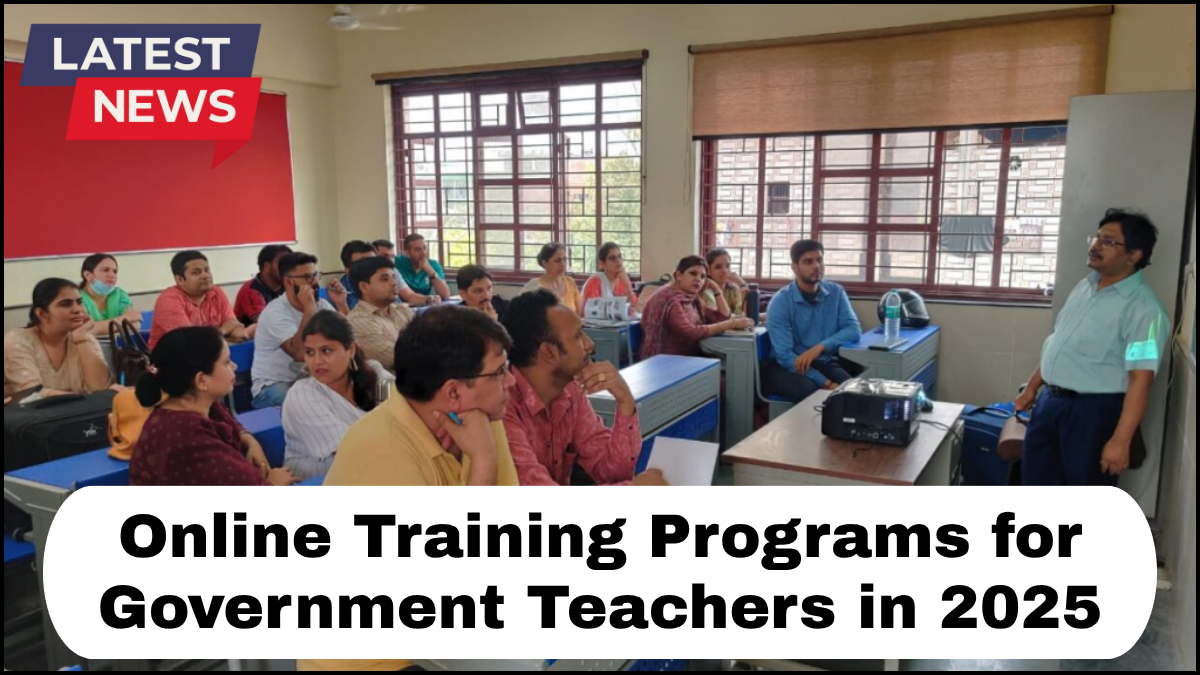The education sector in 2025 is undergoing rapid transformation, driven by digital technologies, policy reforms, and evolving student needs. Government Teacher Training has become more dynamic than ever, with a strong emphasis on online platforms that make professional development accessible, flexible, and up to date. For government school educators, these programs are not just skill upgrades—they are a pathway to improving teaching quality, student engagement, and overall learning outcomes.

Below is an in-depth look at how online training programs are shaping the professional growth of government teachers in 2025.
The Shift to Digital Learning for Teachers
Over the last decade, professional training for teachers has moved from occasional, in-person workshops to continuous, online-based learning. This shift offers several benefits:
-
Accessibility: Teachers from rural, semi-urban, and remote areas can now access high-quality online teacher courses without traveling long distances.
-
Flexibility: Training modules can be accessed anytime, fitting around school schedules and personal responsibilities.
-
Cost-effectiveness: Digital programs reduce expenses on travel, accommodation, and printed materials.
For government teachers, who often work in resource-constrained environments, the rise of online training represents an equalizing force in education.
Key Features of Modern Government Teacher Training Programs
Online training programs in 2025 are designed to meet the diverse needs of government school teachers. The most impactful ones share the following characteristics:
-
Interactive Learning Modules
Courses are no longer static PDF documents. They include videos, quizzes, live Q&A sessions, and collaborative projects that encourage active participation. -
Curriculum Alignment
Programs are aligned with the latest government education policies, such as the National Education Policy (NEP) in India or similar national frameworks elsewhere, ensuring teachers are equipped to meet current curriculum demands. -
Skill Diversification
Apart from core subject knowledge, online teacher courses cover classroom management, digital teaching tools, inclusive education practices, and emotional intelligence in teaching. -
Micro-Credentials and Certifications
Teachers can earn recognized certifications upon completion, which can support career advancement and meet government-mandated training requirements.
Popular Types of Online Teacher Courses for Government Educators
Government teachers now have access to specialized programs tailored to different aspects of teaching:
-
Digital Pedagogy Training – Helping educators integrate smart boards, educational apps, and online resources effectively.
-
Subject-Specific Masterclasses – Offering in-depth content knowledge updates in mathematics, science, languages, and social studies.
-
Inclusive Education Training – Guiding teachers in addressing the needs of differently-abled students and promoting equity in classrooms.
-
Assessment & Evaluation Techniques – Training on competency-based assessments and feedback systems aligned with modern education policies.
Benefits of Online Government Teacher Training in 2025
Government teachers undertaking these online programs experience significant professional growth:
-
Enhanced Teaching Effectiveness – Updated methodologies lead to better student engagement and improved learning outcomes.
-
Time and Resource Efficiency – Teachers can learn at their own pace without disrupting their teaching schedules.
-
Stronger Digital Competence – Equipping educators with the ability to navigate and utilize technology confidently in classrooms.
-
Career Advancement – Certifications add credibility, opening opportunities for promotions or specialized teaching roles.
Challenges and Solutions
While online training offers undeniable advantages, it also presents challenges such as inconsistent internet connectivity, limited device availability, and digital literacy gaps among some teachers. Governments and training providers are addressing these issues through:
-
Offline Access Options – Downloadable course materials for areas with poor connectivity.
-
Device Support Programs – Distribution of tablets or laptops to educators.
-
Basic Digital Skills Training – Introductory sessions to help less tech-savvy teachers participate confidently.
The Future of Teacher Training in the Public Sector
By 2025 and beyond, the focus will increasingly be on blended learning, combining online and in-person sessions for maximum effectiveness. Artificial intelligence is also expected to personalize training content, offering recommendations based on each teacher’s strengths and improvement areas.
Governments are likely to invest more in centralized learning management systems, making training standardized yet adaptable to local needs. This ensures that all government school teachers—regardless of location—receive high-quality, consistent training opportunities.
FAQs
Q1: Why is online government teacher training important in 2025?
Online programs ensure continuous skill development, keep teachers updated with policy changes, and provide equal access to quality training regardless of geographical location.
Q2: Are online teacher courses recognized for career advancement?
Yes. Most certified online programs are recognized by government education boards and can contribute to meeting mandatory training requirements or promotions.
Q3: What kind of topics do these online programs cover?
They cover a wide range—digital teaching tools, subject-specific updates, classroom management, inclusive education, and innovative assessment techniques.
Q4: How can rural government teachers access these programs with poor internet?
Many platforms provide offline access, mobile-friendly content, and downloadable resources, making them usable even with limited connectivity.
click here to learn more